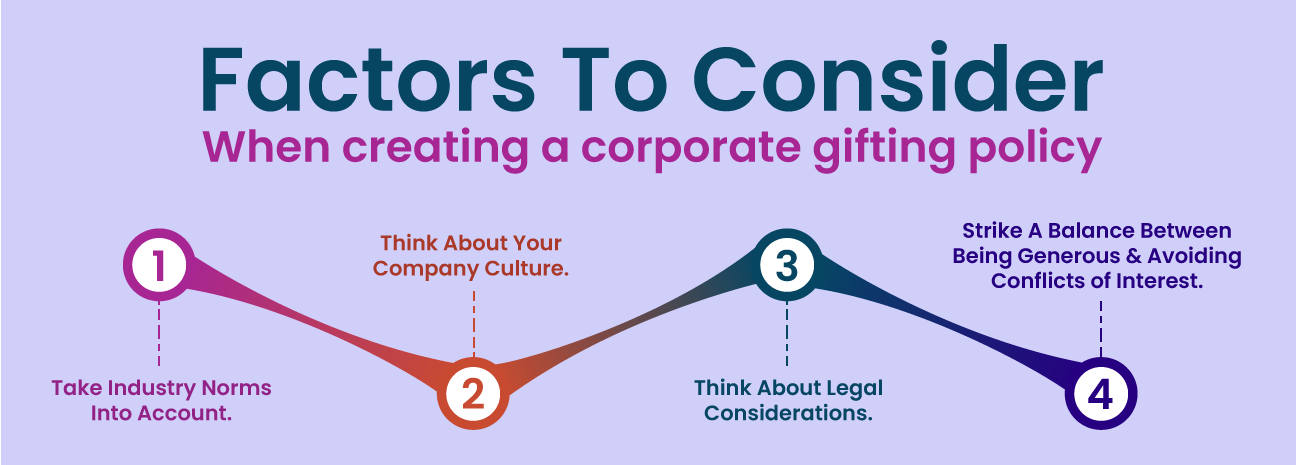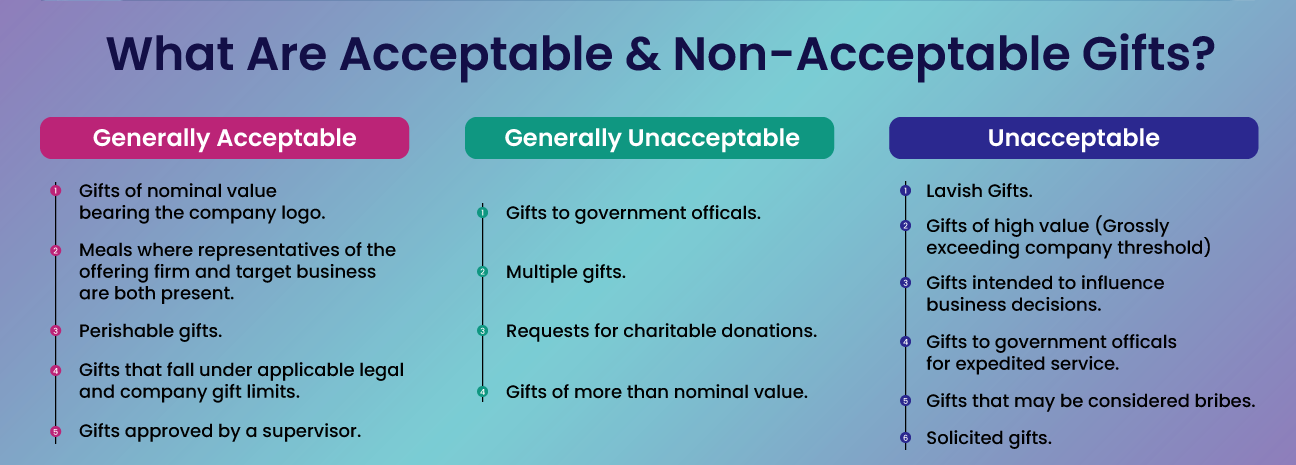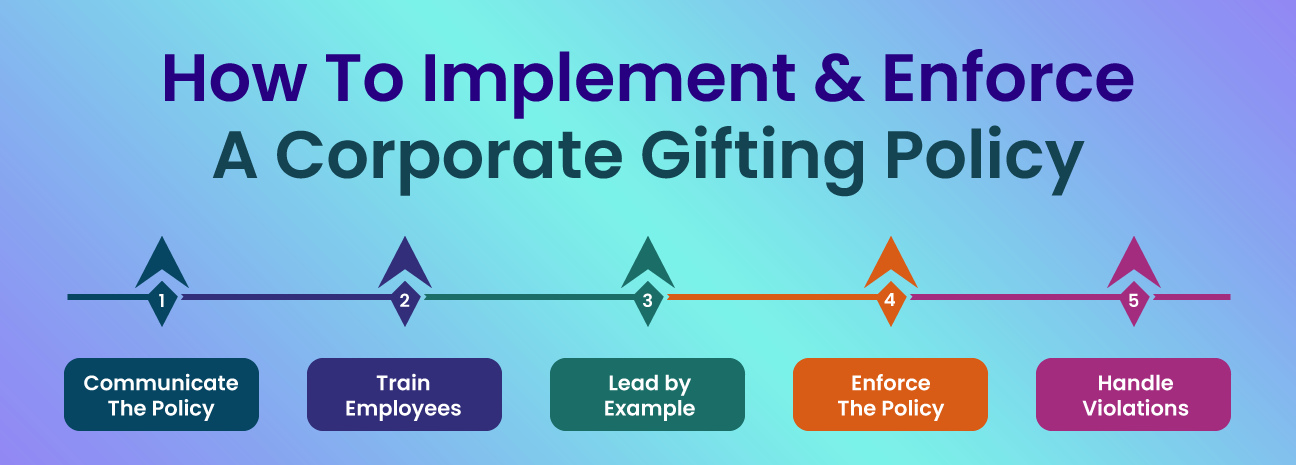
Corporate Gifting Policies: Key Insights for Your Business
Have you ever been on the receiving end of a corporate gift and thought, "What were they thinking?" Or maybe you've been tasked with selecting gifts for clients or employees and found yourself lost in a sea of options, unsure of what to choose.
Have you ever been on the receiving end of a corporate gift and thought, "What were they thinking?" Or maybe you've been tasked with selecting gifts for clients or employees and found yourself lost in a sea of options, unsure of what to choose.
Well, fear not, because we're here to talk about corporate gifting policies - the secret sauce to successful gift-giving in the business world.
So, what exactly is a corporate gifting policy? Well, it's a set of guidelines that dictate how a company gives and receives gifts. From holiday presents to client thank-yous, a good policy ensures that gift-giving is fair, ethical, and aligns with the company's values.
Now, I know what you're thinking - "Why do I need a policy for gift-giving? Can't I just send a fruit basket and call it a day?" Unfortunately, it's not that simple. Without a clear policy in place, gift-giving can become a slippery slope of ethical dilemmas and awkward situations.
In this article, we'll explore
- The importance of having a corporate gifting policy,
- Factors to consider when creating one that works for your company,
- What most corporate gifting policies typically include,
- What are acceptable and non-acceptable gifts,
- Tips to implementing and enforcing them, and
- A few examples of effective corporate gifting policies.
Let’s jump into it!
Importance of having a corporate gifting policy
We've already talked about what a corporate gifting policy is, but now let's discuss why having one is so important.
First of all, not having a policy in place can be a risky move. Without guidelines, it's easy for employees to go overboard with gifts, either in terms of cost or inappropriateness. And let's face it, a gift that's too expensive or too personal can make the recipient uncomfortable, or even worse, lead to accusations of bribery or favoritism.
But that's not all. A lack of clear guidelines can also create confusion and inconsistency in gift-giving practices. Imagine if one employee gives a lavish gift to a client, while another gives a simple token of appreciation.
It's hard to maintain a consistent image for your company if there's no policy in place to guide your employees.
On the other hand, a well-crafted policy can help prevent these ethical dilemmas and maintain a positive company image. By establishing spending limits and appropriate gift categories, employees are empowered to give gifts that are thoughtful and professional, without crossing any lines.
Plus, a clear policy shows that your company values transparency and fairness in all its business dealings.
So, whether you're a seasoned gift-giving pro or a newbie to the game, a corporate gifting policy is a must-have in your company's toolkit.
Factors to consider when creating a corporate gifting policy
When creating your own corporate gifting policy, there are four key factors to take into consideration.

- Take industry norms into account.
- Think about your company culture.
- Think about legal considerations.
- Strike a balance between being generous and avoiding conflicts of interest.
Let’s each at each in detail.
Take industry norms into account
This means researching what's typical in your industry in terms of gift-giving and adjusting your policy accordingly.
For example, in some industries, it's common for vendors to give gifts to clients as a way of building relationships and showing appreciation. In other industries, however, this practice might be seen as inappropriate or even unethical.
By understanding what's typical in your industry, you can ensure that your policy is both thoughtful and aligned with industry standards.
It's also worth considering what your competitors are doing in terms of gift-giving. You don't want to come across as cheap or out of touch with your industry's practices. If your competitors are giving lavish gifts to clients or employees, you may need to adjust your policy accordingly to avoid looking stingy.
Of course, you don't have to follow industry norms exactly. You can still be creative and thoughtful in your gift-giving practices. However, understanding what's typical in your industry can help you strike the right balance between being generous and avoiding conflicts of interest.
Think about your company culture
Your corporate gifting policy should ideally align with your values and the way you do business.
So, what exactly do we mean by company culture? Essentially, it's the set of shared beliefs, values, attitudes, and behaviors that characterize your organization. It's what makes your company unique and sets you apart from other businesses.
When creating a corporate gifting policy, you need to think about how your gifts will reflect your company culture. For example, if your company values sustainability, you may want to prioritize eco-friendly gifts. If you're a startup with a casual work environment, you may want to focus on gifts that are fun and lighthearted.
Another important factor to consider is your budget. You don't want to overspend on gifts, but you also don't want to appear cheap or ungenerous. You need to strike the right balance based on your company's financial situation and the expectations of your clients or employees.
You should also think about the practicalities of implementing your gifting policy. Who will be responsible for selecting and purchasing gifts? How will you ensure that everyone follows the policy? These are all important questions to consider as you create your corporate gifting policy.
Your company culture should play a big role in shaping your corporate gifting policy.
Legal considerations
The last thing any company wants is to accidentally engage in bribery or corruption. To prevent that, there are strict laws in place to prevent bribery and corruption, and it's essential to follow them.
Take India, for instance.
One factor to consider is the value of the gifts. In India, the limit for gifts is Rs. 5,000, which is around $68. It's important to ensure that your company's gifts fall within this limit to avoid any legal repercussions.
Another factor to consider is who the gifts are given to. India's anti-corruption laws prohibit giving gifts to government officials or employees of state-owned companies. Your company's policy should specify who can receive gifts and under what circumstances.
Your policy should also have clear guidelines for gift-giving, including what types of gifts are acceptable, who can give gifts, and what the process is for giving gifts. This will ensure that gift-giving is done in a transparent and ethical way.
Lastly, it's crucial to train your employees on the corporate gifting policy and the legal considerations around it. This will help ensure that everyone is aware of the policy and follows it.
Strike a balance
Corporate gifting can be a great way to show appreciation to clients, partners, and employees. However, it's essential to strike a balance between being generous and avoiding conflicts of interest.
Here are some factors to consider when creating a corporate gifting policy.
- Define the purpose of corporate gifting. Is it to strengthen relationships, show appreciation, or promote the company's brand? This will help you determine who to gift, when to gift, and what to gift.
- Establish clear guidelines for giving and receiving gifts. Set a limit on the value of gifts, so as not to create any impression of bribery or favoritism. Be clear about what types of gifts are appropriate and inappropriate. For example, expensive items like jewelry or alcohol may not be suitable for certain recipients.
- Consider the cultural and ethical aspects of gift-giving. Different cultures have varying views on gift-giving, and it's essential to be aware of this when choosing gifts. Additionally, ensure that the gifts do not violate any ethical or legal standards.
- Review and update the policy regularly. As the company grows and evolves, so should the policy on corporate gifting. This will ensure that the policy remains relevant and effective.
What do corporate gifting policies typically include?
This section is more about some of the more important information that almost every corporate gifting policy includes. Here are some of the common items you'll find.
- Who can employees give gifts to and when is it appropriate? You don't want to accidentally give a gift to the wrong person or at the wrong time.
- Who can employees give gifts to outside the organization and when is it appropriate? It's important to know the rules around gifting outside of your company too.
- Policies around receiving gifts from coworkers, superiors, direct reports, and those outside the organization. You want to make sure everyone is on the same page when it comes to giving and receiving gifts.
- What gifts are considered "Generally Acceptable," "Generally Unacceptable," and "Unacceptable." You don't want to give a gift that's considered inappropriate or offensive.
- A maximum monetary value of gifts. You don't want to break the bank on gifts, so it's important to know what the maximum amount is.
With that said,
What are acceptable and non-acceptable gifts?
Before you start accepting all those fancy presents, make sure you know the rules! Check with your company lawyer or accountant if you're unsure, and chat with HR or finance to review any policies that might apply to you.
Usually, the gifts that are A-OK include low-value items with the company logo (hello, branded squeeze ball!), meals, and yummy perishable gifts. Sometimes, your supervisor might need to approve gifts, so check the policy for details.
Now for the no-nos. Corporate gifting policies typically say employees can't give gifts to government officials or anyone that could be considered a bribe (i.e., something given to influence business or government decisions).
High-value gifts or gifts in multiples are also usually off-limits. And don't even think about soliciting others for gifts or charitable donations - that's a big no-no.
So, if you're sending a personalized note with your gift (which is totally cool, by the way), just make sure it can't be misinterpreted as a bribe. And remember, it's always better to err on the side of caution when it comes to gifts and business relationships.
With that said, here is a list of gifts that are widely categorized as "Generally Acceptable," "Generally Unacceptable," and "Unacceptable."

How to implement and enforce a corporate gifting policy
Alright, so you've got your fancy new corporate gifting policy, but how do you make sure it's implemented and enforced? Here are 5 fun tips on how to do just that.

- Communicate the policy
- Train employees
- Lead by example
- Enforce the policy
- Handle violations
Let’s take a closer look at each.
Communicate the policy
It's important to communicate the policy clearly to all parties involved. Consider using visuals like infographics or videos to make it engaging and easy to understand. You can also hold a meeting to discuss the policy and answer any questions that arise.
Make sure everyone knows where to find the policy if they need to refer to it later.
Train employees
Once you've communicated the policy, it's important to train your employees on how to follow it. This could involve a workshop, training session, or even an online course. Make sure that the training is engaging and interactive, and encourage employees to ask questions. You could also incorporate fun gift-giving games or quizzes to make the training more enjoyable.
Lead by example
As a leader, you need to set an example for others to follow. This means following the policy yourself and making sure that others do too. When employees see that you're following the policy, they're more likely to do so themselves.
Enforce the policy
It's important to enforce the policy consistently and fairly. Make sure that employees understand the consequences of violating the policy and that you follow through on them.
This could involve a verbal warning for minor violations or termination for more serious offenses. Be clear and transparent about the consequences.
Handle violations
If a violation occurs, it's important to handle it promptly and fairly. Investigate the situation thoroughly, gather evidence, and take appropriate action. Make sure that all parties involved understand the outcome and why it was decided. This will help maintain trust and transparency.
Are you looking for inspiration for your corporate gifting policy? Well, look no further! Here are some fun pointers that showcase examples of four effective corporate gifting policies from other well-known companies in the country.
Accenture
This consulting firm has a policy that emphasizes ethical and sustainable gifts. They encourage employees to choose gifts that are environmentally friendly and socially responsible. This not only aligns with the company's values but also shows clients and partners that Accenture cares about making a positive impact.
The tech giant has a policy that focuses on charitable giving. Instead of giving traditional gifts, they make a donation to a charity of the recipient's choice. This not only promotes social responsibility but also allows the recipient to feel good about the gift they've received.
Infosys
Infosys has a policy that emphasizes local sourcing. They encourage employees to choose gifts that are made in India and promote local artisans and craftspeople. This not only supports the local economy but also shows clients and partners the rich cultural heritage of India.
Tata Group
This Indian conglomerate has a policy that focuses on giving experiences instead of physical gifts. They offer employees the option of choosing experiences like vacations or cultural events instead of traditional gifts. This not only promotes work-life balance but also allows employees to create lasting memories.
Corporate Gift Options That Align with Corporate Policy
Certainly! Here's a detailed exploration of various corporate gift ideas that align with ethical guidelines and thoughtful consideration:
Shareable Items: Cookies, cupcakes, or a team lunch that can be shared among a group are excellent for fostering camaraderie and spreading goodwill throughout an office. They also provide an opportunity to subtly promote your brand.
Charitable Contributions: Gifts that support causes important to the recipient's organization show genuine thoughtfulness and align with ethical practices. For example, contributing to a charity that the recipient's company actively supports can leave a lasting positive impression.
Fun, Unique, and Economical Items: Coffee gift cards, customized branded items based on individual preferences. These items can be fun, memorable, practical, and within budget.
Matching Gifts: Encourage employee engagement and corporate social responsibility by implementing a matching gift program. This allows employees to donate to charitable organizations of their choice, with the company matching their contributions, thereby doubling the impact of their donations.
Digital eCards: Personalized greeting cards for various occasions, such as birthdays, work anniversaries, or to acknowledge exceptional performance. They allow for personal messages and are environmentally friendly.
Tangible Gifts: Gift baskets curated with gourmet treats, wellness products, or a combination of items that cater to the recipient's interests. Personalized stationery or office accessories can be practical and thoughtful, suitable for enhancing the recipient's workspace.
Tribute Gifts: Donations in honor of employees who are passionate about specific causes. Recognize their dedication by making donations to charities or organizations they actively support. For example, if an employee volunteers at a local animal shelter, consider donating to that shelter on their behalf as a token of appreciation.
By carefully selecting gifts that are thoughtful, practical, and align with ethical guidelines, companies can strengthen relationships with clients and employees. This approach not only conveys appreciation but also enhances corporate culture and reputation. Explore our range of products at Swageazy to find ideal gifts for your employees and clients.
Conclusion
Corporate gifting can be a tricky business. On one hand, it's a great way to show appreciation to your clients, customers, and employees. On the other hand, it can lead to conflicts of interest and ethical dilemmas. That's why having a solid corporate gifting policy is so important.
One thing that stands out from this article is the importance of personalization, sustainability, and ethical considerations when it comes to corporate gifting. By incorporating these values into your policy, you can ensure that your gifts are meaningful, socially responsible, and aligned with your company's values.
Another key takeaway is the importance of communication and enforcement when it comes to corporate gifting policies. You need to make sure that everyone in your organization is on the same page when it comes to giving and receiving gifts. And if there are any violations of the policy, they need to be handled appropriately.
Having a solid corporate gifting policy can help you avoid conflicts of interest and ethical dilemmas, while also showing your appreciation to your clients, customers, and employees.
So take the time to create a policy that works for your organization, and don't be afraid to get creative with your gift-giving!